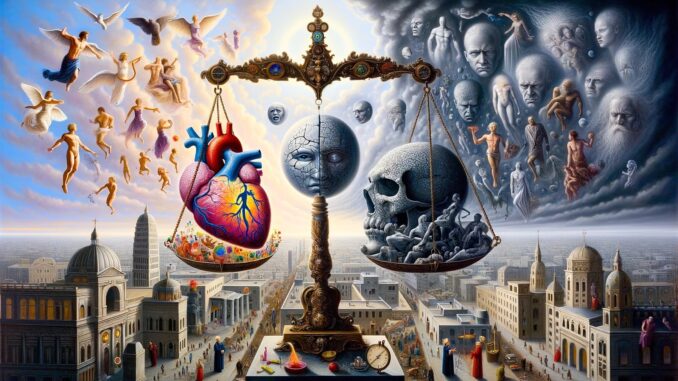
“Civilization and Its Discontents,” by Sigmund Freud, published in 1930, is a pivotal work in psychoanalytic theory that explores the inherent conflict between individual desires and societal norms.
- Inherent Conflict Between Individual and Society: Freud emphasizes the perpetual tension between individual instincts, particularly sexual and aggressive impulses, and the restrictive norms of society. This fundamental conflict leads to a chronic sense of discontent among individuals.
- Role of the Superego: The superego, embodying societal morals, clashes with the id (source of instinctual desires) and is moderated by the ego, which tries to balance these opposing forces. This dynamic often results in guilt or anxiety, reflecting the struggle to reconcile personal desires with societal expectations.
- Pursuit of Happiness and Civilization’s Suppression of Instincts: Freud questions the ability of civilization to deliver true happiness, as it demands the suppression of natural instincts. He suggests that happiness is derived from the pursuit of pleasure and the avoidance of pain, but civilization’s restrictions limit these pursuits, leading to discontent.
- Dual Nature of Love and Aggression: He explores how civilization is built on love and cooperation but also contends with inherent human aggression. The balance between these aspects is crucial for societal stability.
- Sublimation: Freud discusses sublimation as a process where repressed sexual and aggressive energies are redirected into socially acceptable activities like art, science, and work, contributing significantly to cultural progress.
- Eros and Thanatos: Introducing the concepts of Eros (life instinct) and Thanatos (death instinct), Freud suggests that human behavior is driven by these two primal forces. Eros fosters life, love, and creativity, while Thanatos leans towards aggression, destructiveness, and a subconscious desire for death or return to an inorganic state.
- Religion as Illusory: Freud views religion as an illusion, a construct to cope with life’s hardships and mortality. He sees it as a form of escapism, providing a false sense of security in a chaotic world.
- Modern Discontent and Technology’s Impact: Reflecting on modern civilization, Freud notes that technological advancements and increased control over nature have not necessarily led to greater happiness.
- Love and Work as Key to Happiness: He concludes that love and work are essential components of civilization and crucial for human contentment.
- Cultural Discontent and Internalization of Societal Constraints: The restrictions imposed by civilization lead to cultural discontent, as they counteract basic instincts. This results in an internal sense of guilt or the “sense of guilt,” reflecting the internalization of societal constraints.
In summary, “Civilization and Its Discontents” offers a profound exploration of the complex relationship between individual primal desires and societal norms, highlighting the resulting perpetual state of discontent and the psychological mechanisms humans use to cope with these tensions.
Leave a Reply